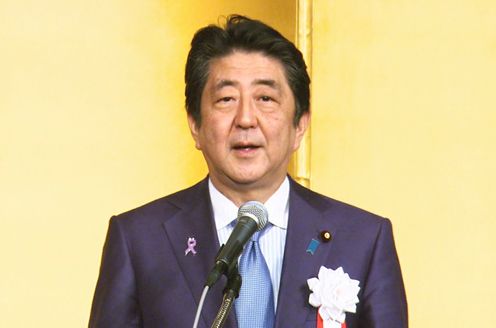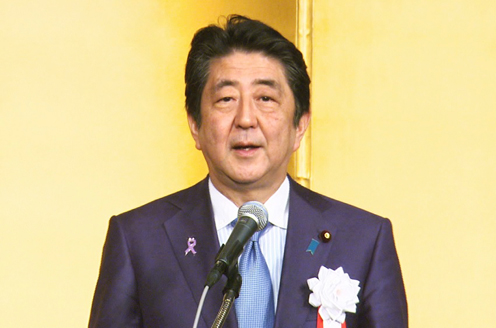Home > News > The Prime Minister in Action > November 2017 > The General Assembly of Japan's National Council for Export Promotion of Agricultural, Forestry and Fishery Products and Processed Foods (JAECAP 2017)
The Prime Minister in Action
The General Assembly of Japan's National Council for Export Promotion of Agricultural, Forestry and Fishery Products and Processed Foods (JAECAP 2017)
November 24, 2017
[Provisional Translation]
On November 24, 2017, Prime Minister Shinzo Abe attended the General Assembly of Japan's National Council for Export Promotion of Agricultural, Forestry and Fishery Products and Processed Foods (JAECAP 2017) held in Tokyo.
The Prime Minister said in his address,
“I would like to offer some congratulatory remarks upon the opening of JAECAP 2017.
I would like to begin by expressing my heartfelt congratulations to everyone who was awarded today for their distinguished contributions to the promotion of Japanese food overseas. All of you have worked wholeheartedly over long periods and have overcome various hardships to promote Japanese food overseas where eating habits are different. You have my deep respect for the way you have taken the lead on the export of Japanese agricultural, forestry and fishery products and foods, and pioneered new markets.
This July, an agreement in principle was reached on the Japan-EU Economic Partnership Agreement (EPA). In addition, this month, an agreement on the TPP11 was confirmed at the ministerial level. With these agreements, the tariffs that have been applied to Japan’s agricultural, forestry, and fishery products and foods will be eliminated in many countries. This represents a major opportunity to expand the export of delicious and safe Japanese products to markets around the world.
I myself, on the margins of summit meetings and other occasions, have been actively calling for the easing or elimination of regulations in countries that are acting as a barrier to Japanese exports. This year, bans on Japanese exports have been lifted for pears to Viet Nam, beef to Taiwan, and persimmons to the United States.
The Abe Cabinet today approved a comprehensive TPP-related policy framework that includes measures for the strategic promotion of the export of agricultural, forestry, and fishery products and foods. We will continue to offer our full support to all of you involved in exports.
The total amount of agricultural, forestry, and fishery products and foods exported last year was valued at over 750 billion yen, hitting a record high for the fourth consecutive year. Furthermore, we are on track to set a new record this year as well.
There are approximately 120,000 Japanese restaurants overseas. Japanese food continues to see rising popularity in foreign countries. The global food market is growing continuously. There is still significant room to increase the export of Japanese agricultural, forestry, and fishery products and foods by capturing this demand.
Let us first start by further increasing the export of Japan’s wonderful agricultural, forestry, and fishery products and foods, with Minister Saito and everyone here working together, toward achieving our 1 trillion yen export target by 2019.
Upon retaking the reins of government we stated that we would increase exports of agricultural, forestry, and fishery products. At that time, the pervading atmosphere was that this was an impossible task. However, if you put your mind to it, anything is possible. We are now expected to have record high exports for the fifth consecutive year. Under these circumstances, the number of new farmers who are 40 years of age or younger has exceeded 20,000 people for three years in a row. This is the first time this has happened since we started keeping statistics. I believe young people have begun to feel that agriculture is a sector where they can open up new horizons through their own passion and hard work.
I think we will continue to see the advent of more delicious, safe, and wonderful agricultural, forestry, and fishery products. We will create even more robust channels for the export of these products overseas. With your cooperation, we will also create frameworks that will leave steady profits for producers.
In closing, I would like to conclude my remarks by wishing everyone further success. Congratulations.”


